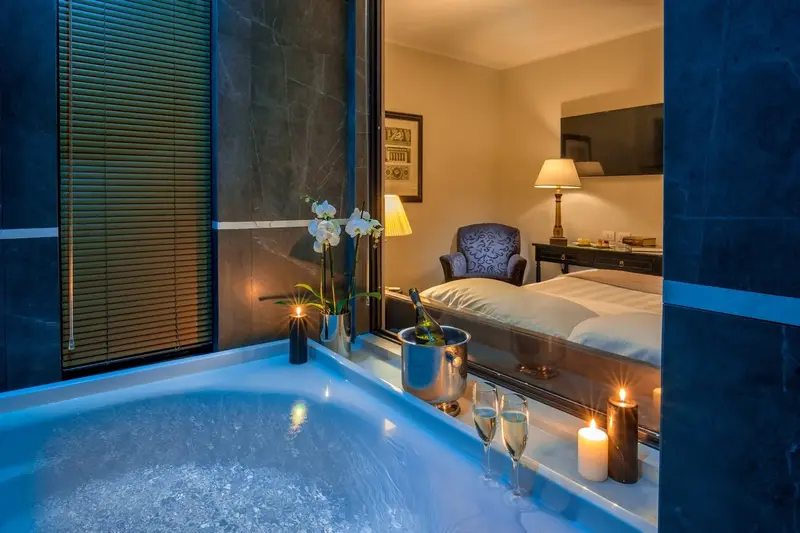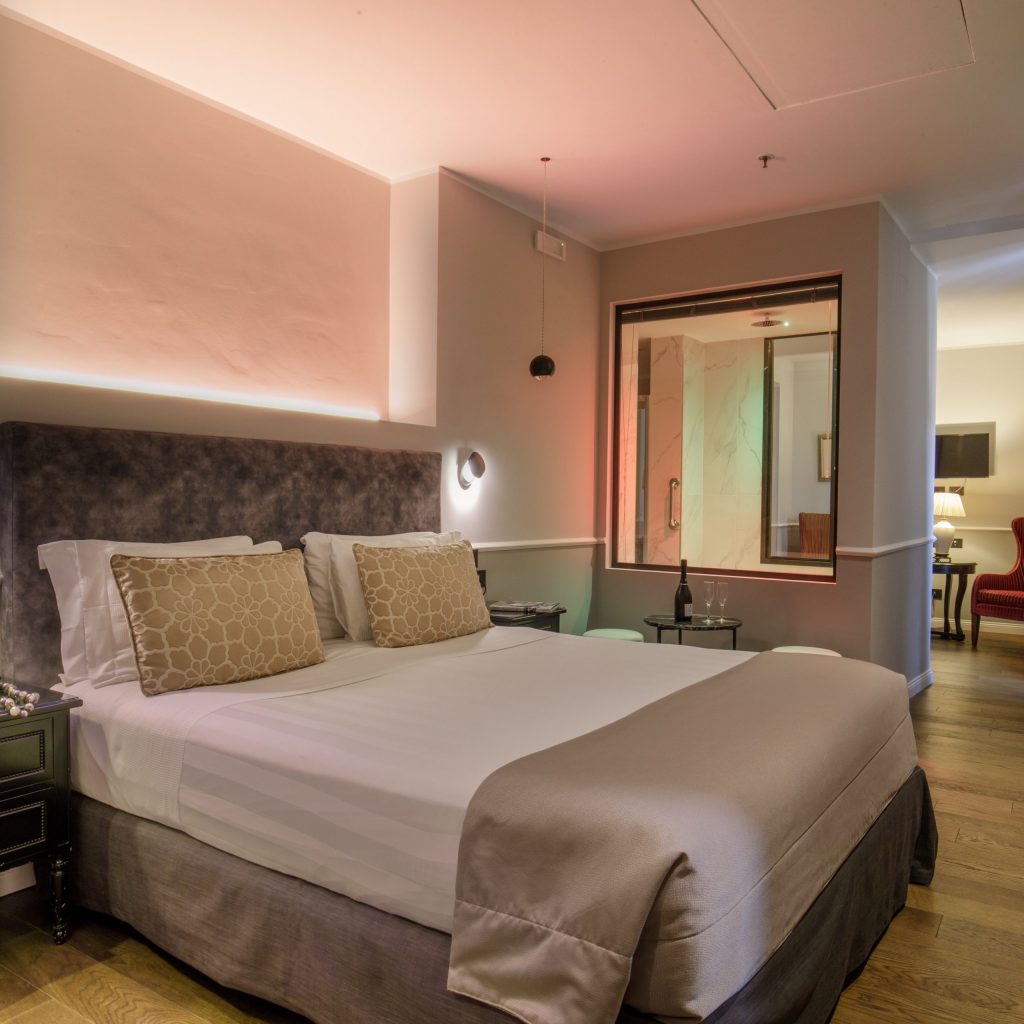Boutique Hotels: Definition, History, and Key Features
In recent years, boutique hotels have become increasingly popular in the hospitality industry. Unlike large chain hotels, boutique hotels are ready to offer guests unique individual experiences that are often difficult to find in ordinary hotels. In this article, we will look at the very concept of boutique hotels and the characteristics that distinguish them from traditional hotels, as well as show some details using the example of our hotel.
What is a Boutique Hotel?

So, what is a boutique hotel? A boutique hotel is a type of small, stylish hotel that offers a variety of customized services to its guests. Such hotels often target niche markets (for example, couples who prefer a romantic vacation, or business travelers who need a quiet and comfortable workplace). Overall, boutique hotels offer a high-end personalized experience, which sets them apart from traditional hotels.
The Emergence of Boutique Hotels
Boutique hotels originated in the 80s of the XX century, when several groups of hoteliers, independently of each other, decided to create hotels that would be more cozy and individual than the large, impersonal hotels common at that time.
There is still debate about who exactly created the first boutique hotel, but among the first projects of this type, London Blakes, Bedford in San Francisco and Morgans in New York are always mentioned. The founders and designers of these first boutique hotels wanted to provide their guests with a unique and unforgettable experience that would set their hotels apart from others. Over the years, the concept of boutique hotels has changed, but the emphasis on individual service and attention to detail has remained unchanged.
Key Features of Boutique Hotels
Privacy and Exclusivity
One of the defining characteristics of boutique hotels is their secluded and exclusive atmosphere. Boutique hotels tend to have fewer rooms than traditional hotels, which allows for a more personal approach to guests. The smaller size gives guests a feeling of exclusivity, as if they belong to a select group of travelers.
Privacy is another key advantage. For many guests – from ordinary couples in love, to traveling celebrities, or big businessmen – it is important to avoid excessive attention from others. And for such guests, boutique hotels are the solution to this problem.

For example, we have such guests staying at Brighton on a regular basis, and we are ready to provide an exclusive approach to everyone. And thanks to the competent design of the hotel, all guests are provided with additional privacy.
Our guests regularly make unusual requests, from the delivery of exclusive products to the special decoration of the room, and we treat each of them with increased attention.
Unique and Personalized Design
Another key characteristic of boutique hotels is their unique and individual design. Unlike regular hotels, which often have a single design and decor, boutique hotels are designed to reflect personality and style. This can include everything from the architecture of the building to the artwork on the walls. Guests staying in boutique hotels often note the originality and creativity of the design.
For example, the Riad Kheirredine in Marrakech offers traditional Moroccan architecture and decor, a rooftop terrace with a hot tub and a spa center. The Relais & Chateaux Heritage Hotel in Bruges, Belgium, located in a 15th-century building in the historic city center, offers elegant rooms with antique furniture, a courtyard garden and a gourmet restaurant.
At the Brighton Boutique Hotel, you can enjoy rooms with hot tubs, rooms with panoramic windows overlooking the park, an exclusive restaurant with British-style rooms, as well as a spa area with a hammam and a traditional sauna.
Attention to Detail
Boutique hotels are known for their attention to detail. From the quality of the bed linen to the choice of toiletries, every aspect of the guest service is carefully thought out. The staff of boutique hotels are trained to anticipate the needs of guests and do everything possible to make their stay as comfortable and enjoyable as possible.
The French Hotel de la Cité in Carcassonne is equipped with luxurious suites that combine early 20th century architecture and advanced technology, as well as a Michelin-starred restaurant.

At our hotel, we use the best suppliers and offer guests the most advanced technologies from pillow menus to bactericidal circulators and VR glasses.
Individual Service
An individual approach is a hallmark of boutique hotels, and this is reflected in everything from how guests are greeted at check-in to the concierge’s recommendations. Boutique hotel staff are trained to provide responsive, personalized service. This often includes offering exclusive amenities and services that meet the different needs and preferences of each guest.
For example, at Brighton we appreciate an individual approach to a guest. The staff undergoes special training to be able to communicate with the guest as with a living person, avoiding standardization and template methods of behavior.
Focus on the Impressions of the Guests
Finally, boutique hotels are characterized by the fact that they pay special attention to the impressions of guests. The staff makes every effort to create a welcoming and memorable atmosphere. This often includes hosting special events and promotions, providing unique amenities and personalized recommendations for local attractions and entertainment.
Let’s mention here the Italian Monastero Santa Rosa – a former monastery turned into an upscale hotel with an unforgettable sunrise view. As well as the Arctic Light Hotel in Rovaniemi, Finland, located on the Arctic Circle and providing a roof terrace for observing the northern lights.

Drake Bay Getaway Resort in Costa Rica is considered one of the best hotels for newlyweds due to its location next to a national park and the ocean. The hotel provides easy access to hiking trails and beaches, creating an atmosphere of romance.
In Brighton, we focus on organizing various festive events of an exclusive nature. Our location in a quiet area near the park makes it easy to hold a wide range of events from exclusive chamber weddings to themed New Year’s Eve parties.
Food and drinks
Impressing guests through taste is one of the important tricks that most boutique hotels use. Restaurants in such hotels are usually smaller in size and often have a more private atmosphere. They are usually decorated in accordance with the style and atmosphere of the hotel, creating a unified impression for the guests. The menu of boutique hotel restaurants is focused on local and seasonal ingredients, emphasizing the taste qualities of the region. Many of them also offer innovative and creative dishes, often created by top chefs.
So one of the most famous culinary boutique hotels Velaa, located on a private island in the Maldives, offers its guests several restaurants, including one with a Michelin-starred chef.
The 29 Park Lane restaurant at the Brighton Boutique Hotel has three rooms ranging from a luxurious British living room to a summer veranda in the park. Our guests can always try something from the fresh seasonal menu, as well as enjoy original dishes in Russian and European style from our chef.
7 Advantages of Staying in Boutique Hotels
Why should you choose a boutique hotel to stay in? Let’s briefly list the main arguments.
1. A Unique Experience
Boutique hotels offer a unique experience that cannot be replicated in regular chain hotels. Each boutique hotel has its own personality and style, which already makes it unforgettable for guests.
2. High-Quality Services
Boutique hotels often offer high-quality amenities that are not available in regular chain hotels. For example, spa services, gourmet restaurants or individual concierge services.
3. Location
Many boutique hotels are located in unique and interesting places, for example, in historical buildings, trendy shopping areas or even reconstructed industrial buildings, in picturesque natural landscapes. This can make them an ideal choice for travelers who want to be in close proximity to events or explore unique places.
4. Local Flavor
Boutique hotels often showcase local culture and flavor, providing guests with an authentic and immersive experience.
5. Environmental Protection
Many boutique hotels adhere to environmentally friendly working methods, for example, using eco-friendly materials or reducing waste, which can be attractive to guests who value environmental friendliness.
6. The Atmosphere of Comfort
Boutique hotels are usually smaller in size than regular chain hotels, which creates a more intimate and cozy atmosphere. Such hotels often offer more privacy than regular hotels, which can be ideal for couples looking for romance or those who want to escape the hustle and bustle of busy hotels.
7. Cost
Despite the high-end amenities and individual approach, boutique hotels often turn out to be more affordable than regular chain hotels, which makes them an excellent choice for guests who want to get a luxurious experience and do not regret heavy spending after traveling.
Problems related to the management of a boutique hotel
It seems that boutique hotels are a solid advantage. But then why don’t all hotels turn into hotels of this type? Let’s talk about the disadvantages.
High Operating Costs
One of the main and obvious problems in managing a boutique hotel is the higher operating costs associated with providing an individual approach to guests. Boutique hotels often have a higher staff/guest ratio than large chain hotels, and this can have an impact on profitability. In addition, the design and decoration costs of a boutique hotel can be higher than in a traditional hotel, as owners often invest in unique and customized furniture and decor.
The Key to Success here is a Competent Approach When Working with a Budget.
The Difficulty in Maintaining Consistency
Another problem in managing a boutique hotel is the difficulty of maintaining a stable quality of services. Since each room and each guest is unique, it can be difficult to ensure the consistency and high quality of service for each guest. This can become an especially difficult task as the hotel grows and expands.
The solution may be constant staff training and preventing staff turnover.
Smaller Target Market
Boutique hotels have a smaller target market than large chain hotels because they can be more expensive and designed for a certain type of traveler. This can make it difficult to attract a steady stream of guests, especially during downturns.
However, for hotel guests, such a “minus” can easily turn into a “plus”. In search of new customers, boutique hotels can reduce prices or arrange favorable promotions for accommodation.
Limited Scalability
Because boutique hotels often focus on creating a unique and personalized experience for guests, it can be difficult for them to replicate that experience in new locations or on a large scale.
On the other hand, any attempt to create a clone of a successful project can easily turn a unique hotel into “one of many”. So it is often necessary to work on scalability with great attention to detail.
Regulatory and Legal Difficulties
Boutique hotels may face problems with local legislation, especially if they are located in historic buildings or in areas with strict zoning laws.
Examples of the best boutique hotels around the world
Hotel Monte Cenci (Rome, Italy) — Nestled in the heart of Rome, this boutique hotel blends historical charm with contemporary luxury. Guests enjoy personalized service, elegantly styled rooms, and a rooftop terrace that offers panoramic views of the Eternal City. Its central location allows easy access to Rome’s historic sites while maintaining a serene, exclusive ambiance.

Emaho Sekawa (Fiji) is a coastal boutique hotel offering luxury villas with private pools, a spa and a restaurant serving local cuisine.
Byblos Art Hotel (Verona, Italy) — The hotel is located in a XV century villa and offers a unique combination of modern art and antique furniture, a sculpture garden and a restaurant with a Michelin-starred chef.
Te Koi — The Lodge At Bronte (New Zealand) — the hotel is located in a vineyard, has luxurious rooms with private terraces, a spa and a restaurant serving local cuisine.
Green Spa Resort Stanglwirt (Austria) — located in the Austrian Alps, offers a spa center with a variety of treatments and activities, including yoga and horseback riding.
Rancho Pacifico (Costa Rica) is a boutique hotel in the rainforest with ocean–view suites, a spa and a restaurant serving local cuisine.
Phulay Bay Ritz-Carlton Reserve is a resort in southern Thailand with villas and pavilions with private pools and a futuristic spa located on the beach by the Andaman Sea.
Why to Choose Boutique Hotels?
In conclusion, we note that boutique hotels offer a unique and individual approach to guests, which is becoming increasingly popular among travelers. With a focus on privacy, attention to detail and unique design, boutique hotels are a memorable and distinctive alternative to traditional hotels. The popularity of boutique hotels continues to grow, and this type of vacation will always be a sought-after option for travelers who appreciate an exclusive approach and a special vacation experience.



